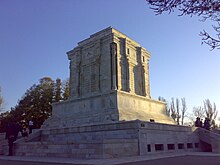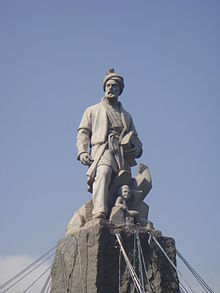Firdausi
Abu l-Qasem-e Ferdousi , German Ferdosi or Firdausi ( Persian ابوالقاسم فردوسی Abū ʾl-Qāsim-i Firdausī , also Ferdowsi ; born 940 in Bāž (also called Tabaran-e Tus ), a village in the Tūs district, Iran (near Mashhad ); died 1020 in Tūs), was a Persian poet and one of the greatest epic poets . He is the author of the monumental, about 60,000 verses comprehensive Shāhnāme ( German "Book of Kings" ), the national epic of the Persian-speaking world , which wasstarted inpart by the poet Daqīqī . With the Shāhnāme, Firdausi created the world's greatest epic by a single poet.
Firdausi's real name and patronymic were passed down differently. The Arab historian al-Bundari, who translated the shahnameh into Arabic, names Mansur b. Hasan. His pseudonym "Firdausī" literally means "the heavenly one".
Life
Apart from his kunya (Abu'l-Qāsim = 'father of Qāsim') and his stage name "Firdausī" nothing certain is known about his name or the identity of his family. As a member of a wealthy Dehqan family, Niẓāmī ʿArūḍī (Neẓāmī-ye ʿArūẓī) reports, he was a “man with influence in his village” and was initially financially independent. Firdausi's teacher is said to have been the poet Essedi.
Many passages in his work reveal his love for Iran. He was certainly familiar with the Arabic language and had also acquired a great deal of knowledge about the history and legends of ancient Iran very early on, which he had got to know through his family environment.
Due to the increasing preoccupation with his life's work, which he had started around 976, he became impoverished. He then placed himself under the protection of the then most powerful ruler of the Islamic world, Mahmūd von Ghazna , who had gathered at his court numerous artists and writers, such as Unsuri , who was highly valued by Mahmud at the time , but was himself not considered to be artful. With the exception of one trip to Baghdad, Firdausi spent his entire life in Khorasan , where he traveled a lot, collecting material for his work.

At the age of 65 he traveled to Ghazna to present his work to Mahmūd, who, however, paid little attention to it. Firdausi complained that Mahmūd had not even looked at it, and Niẓāmī ʾArūḍī spread the tradition that Mahmūd promised a gold coin for each verse but only gave one silver coin, whereupon the offended Firdausi paid his fee to a lemonade seller and a pool attendant should have given away. The real reason for the rejection of the work was possibly the lack of literary understanding of the ruler and the religious differences between Firdausi and the Sunni Mahmūd. In Shahname Firdausi gave the description of the Zoroastrian culture of thought and festivities a large space, while Islam was not mentioned any further. Only in the last chapter of the Shahname, in which Firdausi depicts the end of the Sassanid Empire, are verses in Rostam Farrochzād's letter to his brother before the battle of Kadesia that explain what Iran can expect after the Arab conquest and the subsequent Islamization . Legend has it that Firdausi was refused to be buried in the Islamic cemetery of his hometown because of these critical verses - but above all because of his Shiite denomination. According to Niẓāmī ʿArūḍī, this was the decision of the “fanatical Wā'iz (preacher, mullah ) of Ṭābarān (a village near Tus)”, which is why the “pride of the Iranians” was buried in his own garden within the city walls of Ṭābarān. According to the report, the tomb soon became a pilgrimage site.
Firdausi was one of the first representatives of the neo-Persian literary language, which emerged in the 10th century at the court of the Samanids . In the early 20th century, Iranian nationalists made Firdausi the "reawakening" of Iranian identity and the Shahnameh a monument to them. In this context, reference is made in particular to the almost complete lack of Arabic vocabulary in the Shāhnāme, a fact which, however, is probably due to Firdausi's (written and oral) sources: in the chapter on Alexander , which is based on an Arabic manuscript, he also used the Arabic vocabulary of its template.
Under the reign of Reza Shah and the establishment of an Iranian nation state, Firdausi was of outstanding importance. As the poet of the national epic, a newly built mausoleum was dedicated to him in 1934, in which his remains were reburied. Under the reign of Shah Mohammad Reza Pahlavi , a festival in honor of Firdausi, the annual Tus Festival , was founded in 1975 under the patronage of Empress Farah Pahlavi .
Firdausi University Mashhad was named after the poet .
Translated versions of the Shahnameh
- Friedrich Rückert : Firdosi's Book of Kings (Schahname) Sage I – XIII. Edited from the estate by EA Bayer. Reprint: epubli, Berlin 2010, ISBN 978-3-86931-356-6 .
- Friedrich Rückert: Firdosi's Book of Kings (Schahname) Sage XV – XIX. Edited from the estate by EA Bayer. Reprint: epubli, Berlin 2010, ISBN 978-3-86931-407-5 .
- Friedrich Rückert: Firdosi's Book of Kings (Schahname) Sage XX – XXVI. Edited from the estate by EA Bayer. Reprint of the first edition. epubli Berlin, 2010, ISBN 978-3-86931-555-3 .
- Friedrich Rückert: Rostem and Suhrab. A hero story in 12 books. Reprint of the first edition from 1838. epubli, Berlin, 2010, ISBN 978-3-86931-571-3 . (Details)
- Abu al-Qasim Hassan Firdawsi: Houghton Shahnama, Harvard University Press; Facsimile Ed edition, 1981, (English) ISBN 0-674-40854-3 ; ISBN 978-0-674-40854-8
- Abu al-Qasim Hassan Firdawsi: The Legend of Seyavash, Penguin Classics Paperback, Penguin Books Ltd, 1992 (English), ISBN 0-14-044566-8 , ISBN 978-0-14-044566-4
literature
- Volkmar Enderlein , Werner Sundermann (ed.): Schāhnāme. The Persian Book of Kings. Miniatures and texts from the Berlin manuscript from 1605. Gustav Kiepenheuer Verlag, Leipzig et al. 1988, ISBN 3-378-00254-9 .
- Fatemeh Hamidifard-Graber: From bindweed to cypress. The plant kingdom in the “King's Book” of Ferdousī (= Islamic studies. Vol. 294). Klaus-Schwarz-Verlag, Berlin 2009, ISBN 978-3-87997-368-2 (also: Mainz, Univ., Diss., 2006).
- Monika Gronke : History of Iran. From Islamization to the present (= Beck'sche series 2321 C.-H.-Beck-Wissen ). CH Beck, Munich 2003, ISBN 3-406-48021-7 .
- Cl. Huart, H. Massé, VL Ménage: Firdawsī . In: Encyclopaedia of Islam. CD-ROM edition, II: 918a. Brill, Leiden 2003, ISBN 90-04-11040-2 .
- George Morrison: Persian literature (belles-lettres) from the earliest times to the time of Jāmī. In: George Morrison (Ed.): History of Persian literature from the beginning of the Islamic period to the present day. Brill, Leiden 1981, ISBN 90-04-06481-8 , pp. 1-82.
- Parvaneh Pourshariati: The Parthians and the Production of Canonical Shahnames. In: Henning Börm, Josef Wiesehöfer (eds.): Commutatio et Contentio. Studies in the Late Roman, Sasanian, and Early Islamic Near East. In memory of Zeev Rubin (= series history. Vol. 3). Wellem, Düsseldorf 2010, ISBN 978-3-941820-03-6 , pp. 346-392.
gallery
Scene from the Shāhnāme: Rostam shoots Esfandyār with an arrow enchanted by Sīmurgh
Web links
- Ferdowsi Tomb Restoration Act, 1924
- Literature by and about Firdausi in the catalog of the German National Library
- Works by and about Firdausi in the German Digital Library
- Book of Kings
- Firdosi and the Germans, by Khosro Naghed (Persian)
Individual evidence
- ^ Huart / Massé / Ménage: Firdawsī. In: Encyclopaedia of Islam . New Edition; Brill, Leiden; CD version; "FIRDAWSĪ (Ferdosi), Persian poet, one of the greatest writers of epic, author of the Sh āhnāma ( Sh āhnāmé, the Book of Kings)"
- ↑ Huart / Massé: Daqīqī. In: Encyclopaedia of Islam . New Edition; Brill, Leiden; CD version; "Daqīqī [...] the poet to whom we owe the oldest known text of the national epic in the Persian language."
- ↑ Djalal Khaleghi-Motlagh in Encyclopaedia Iranica , article FERDOWSĪ, ABU'L-QĀSEM - Apart from his patronymic (konya), Abu'l-Qāsem, and his pen name (taḵallosá), Ferdowsī, nothing is known with any certainty about his names or the identity of his family.
- ↑ Ernst Bertram : Persische Spruchgedichte. Insel-Verlag, Leipzig (and Wiesbaden branch) 1944 (and 1949) (= Insel-Bücherei, 87), p. 54 f.
- ^ Huart / Massé / Ménage: Firdawsī. In: Encyclopaedia of Islam . New Edition; Brill, Leiden; CD version; "Sprung from a family of dihqāns [qv], he was, according to Niẓāmī ʿArūḍī, a man of influence in his village, of independent means thanks to the revenues from his lands. Numerous passages of his work reveal his love for Iran. He was certainly acquainted with Arabic; and early in life had acquired a deep knowledge of the history and the legends concerning Iran to which his family environment had predisposed him. "
- ^ Peter Lamborn Wilson , Karl Schlamminger: Weaver of Tales. Persian Picture Rugs / Persian tapestries. Linked myths. Callwey, Munich 1980, ISBN 3-7667-0532-6 , p. 118.
- ↑ On the question of Firdausi's religious affiliation see Djalal Khaleqi-Motlagh, in Encyclopaedia Iranica article FERDOWSI, ABU'L-QĀSEM i. Life : "Ferdowsī was a Shiʿite Muslim, which is apparent from the Šāh-nāma itself (ed. Khaleghi, I, pp. 10–11) and confirmed by early accounts (Neẓāmī ʿArūżī, text, pp. 80, 83; Naṣīr- al-Dīn Qazvīnī, pp. 251–52). In recent times, however, some have cast doubt on his religion and his Shiʿism. [...] Ferdowsī showed a prejudice in favor of his own sect and, as is apparent from the exordium to the Šāh-nāma, considered his own sect to be the only true Islamic one. [...] In the cemetery the preacher of Ṭābarān prevented his being buried in the Muslim cemetery on the grounds that Ferdowsī was a Shiʿite, and so there was no choice but to bury the poet in his own orchard. "
- ↑ Nizami'Arūḍī: Chahar Maghaleh. Quoted from: Hezareh Firdausi. Sokhanranyhayeh jammii az fozalaye Iran va Mostashreghine Donya. Donyayeh Ketab, Tehran 1362, p. 119. Persian نظامی عروضی در چهار مقاله "یک واعظ متعصب طوسی از اهل طابران بر ضد فردوسی غوغا بلند کرد و نگذاشت جنازه او در قبرستان مسلمانان دفن شود لهذا آن افتخار قوم ایرانی را در باغ خودش درون دروازه طایران دفن کردند و جداگانه زیارتگاهی شد.."
| personal data | |
|---|---|
| SURNAME | Firdausi |
| ALTERNATIVE NAMES | Abū ʾl-Qāsim Firdausī; Ferdousi; Ferdowsi; Ferdawsi (Persian); the Paradiesische (German translation); Hakim Abu al-Qasim Mansur Ferdousi; Hakim Abol-Gasem Ferdousi Tusi |
| BRIEF DESCRIPTION | Persian poet and national hero |
| DATE OF BIRTH | 940 or 941 |
| PLACE OF BIRTH | Bāž, a village in Tūs District , Iran (now Mashhad ) |
| DATE OF DEATH | 1020 |
| Place of death | Tūs |





